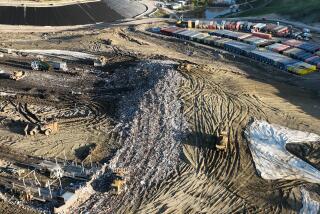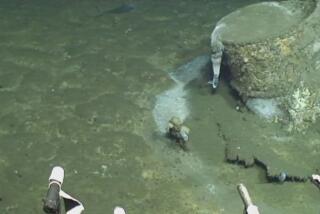1,000 Dumps May Face Fines, Prosecution
WASHINGTON — Two-thirds of the nation’s hazardous waste dumps have failed to certify compliance with federal environmental regulations and face fines and criminal action if they continue to operate, the Environmental Protection Agency announced Friday.
More than 1,000 dumps nationwide did not meet a Nov. 8 deadline requiring them to monitor for pollution of ground water and provide proof that they have sufficient assets or possess liability insurance to pay for future environmental damages, agency officials said.
So far, the agency has not learned of any major manufacturing shutdowns. Most of the dumps that could not certify compliance were small sites on factory grounds, many of which had closed before the deadline.
655 Attempts
Of 655 dump operators that attempted to certify, 492 were found to meet the requirements, the EPA said.
Peter Cook, deputy director of the EPA’s Office of Waste Programs Enforcement, said the agency does not expect any problems in the short run from a lack of dumping space, although it is not clear what will happen in the long run.
Most firms that closed their on-site dumps are expected to store their wastes and eventually ship them to commercial sites or treat the deadly garbage to remove poisons before disposal. Only nine of the nation’s 59 commercial sites failed to meet the regulations.
Cook said inspections are under way at 30 to 50 dumps whose certifications the agency suspects may be false.
Criminal Indictments
“There may be some criminal indictments flowing from these initial investigations . . .,” he said. “Basically, we will go after the most flagrant, false certifications first and take very stringent enforcement action against those. We haven’t filed any criminal actions on this yet, but it’s early and that’s the reason why. It takes some time to prepare a criminal case.”
About 45 of the dumps that failed to certify were unable to obtain liability insurance. Legislation is pending in Congress to allow operators who tried to get insurance to remain in business without it if they meet the ground water monitoring requirements.
Congress approved the requirements in 1981 to protect the nation’s water supplies and ensure that dump operators would be able to pay for any environmental damage they caused. But the operators widely ignored them, and the EPA left them largely unenforced.
More to Read
Sign up for Essential California
The most important California stories and recommendations in your inbox every morning.
You may occasionally receive promotional content from the Los Angeles Times.











